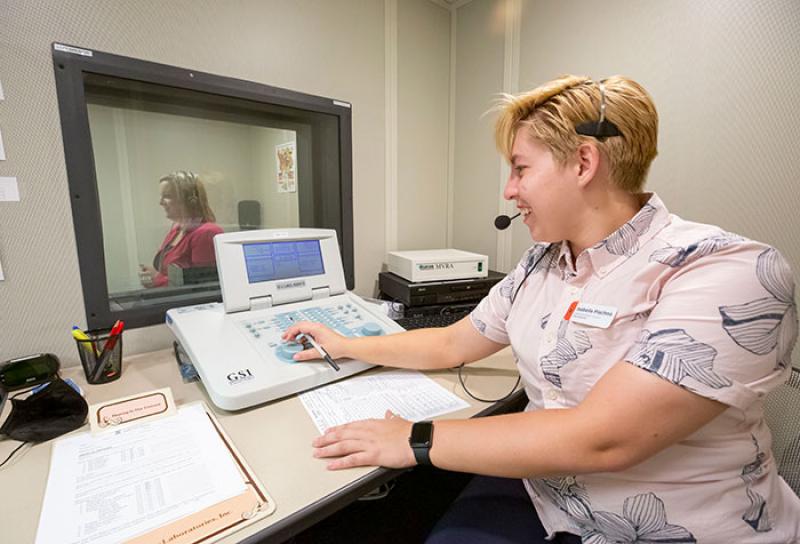
SHS Professor Sees Use of Brain Imaging as Vital to Studying Hearing Disorders
Department of Speech and Hearing Science Professor Fatima Husain received $125,000 in seed grant funding from the Discovery Partners Institute for her proposal titled "Hearing Health Institute."
The main objective for Husain’s proposal is to establish an international center of excellence for hearing research that transforms the field by using artificial intelligence and Big Data to translate research into practical clinical solutions.
“I think insufficient resources (are being) directed towards studying hearing disorders using brain imaging,” Husain said. “The idea, the crux of it (is), can we create a public repository of previously-collected brain imaging data of individuals with normal hearing and various hearing disorders Brain imaging can be very valuable but it is also expensive. It's extremely insightful in a condition like tinnitus, which is a subjective disorder. It can be very helpful in figuring out the impact of hearing loss and aging and differentiating between the two.”
Husain’s team will develop AI and Big Data tools to address three main areas: (1) prediction of clinical outcomes to motivate early intervention, (2) biomarker development to accelerate development of new and effective treatments, and (3) developing patient-centered treatment strategies to restore healthy hearing especially targeting underserved communities.
The idea of Big Data comes in with the creation of the Hearing Health Institute, which will allow for the collection of brain imaging data from about 500 study participants with partner institutions such as Northwestern University and Washington University in St. Louis, Husain said. The team intends to expand the repository by bringing in other affiliate labs.
“We are not just focused on only the hearing aspect of it. We have acquired data from a number of questionnaires testing different things. Other labs may have a lot more of neuropsychological workup, for instance. This additional data is necessary to make sense of the brain images and to compare groups. The images by themselves are not very useful. The metadata about patient characteristics along with the brain imaging big data will allow us to accelerate translational research.”
Another focus for the Hearing Health Institute is to motivate early intervention, Husain said. According to one large-scale longitudinal study Husain cited, as you get hearing loss you seem to cognitively age earlier.
“The idea then, is can we mitigate this kind of cognitive impairment by giving early intervention? By giving amplification earlier, how does it help? (What) we want to do with HHI is to map changes in brain function across the lifespan as a result of hearing loss and include intervention studies where available.
“Like among 55-year-olds, for instance, they show people with hearing loss tend to be slower at doing certain tasks. And that's because they can't hear very well. These are individuals with mild to moderate hearing loss who do not wear hearing aids yet. They have slightly different emotional network engagement and other possible changes. So if we map this out a little better it will motivate, perhaps, early interventions.”
Husain’s project also wants to find a way to better serve underserved communities.
“We're trying to have a sort of the summer internship program, if everything goes well, next summer. And, we are trying to see if college students from Chicago and Champaign-Urbana, from underrepresented groups who have expertise is STEM and get them interested in hearing health and neuroscience.”
“We also want to partner with corporations to devise cheap solutions for hearing health, such as, smart phone-based apps.”
